Insights from Members Weekend 2017
This year’s Members Weekend spanned two days of panel discussions, high-level keynote interviews, roundtables, and a debate on President Obama’s foreign policy. Experts from the U.S. Department of State, the Wilson Center, the RAND Corporation, the United Nations, and many others participated in our signature annual conference.
The conference’s breakout sessions included discussions on Mexico’s 2018 presidential election, Russia’s geopolitical ambitions, cybersecurity, State Department budget cuts, the energy sector post-Paris Accord, the resurgence of nationalist populism, and climate refugees.
The following are just a few of the insights from Members Weekend 2017.
____________________
Mexico’s uncertain political landscape
Chaired by the Honorable Michael C. Camuñez, president and CEO of Monarch Global Strategies LLC, and moderated by Mr. Christopher Wilson, deputy director of the Wilson Center’s Mexico Institute, this panel featured Dr. Pamela Starr, associate professor of international relations at the University of Southern California, and Mr. David R. Ayón, senior strategist and advisor at Latino Decisions.
Some predict that Mexico’s Institutional Revolution Party (PRI), which has long been the largest political party in Mexico, may be losing its grip on the executive branch. Meanwhile, NAFTA renegotiations between Mexico, the United States, and Canada continue with major implications for those three economies.
Starr and Ayón said that forces both domestic and natural are changing Mexico’s political landscape.
"The more the United States seems to be cutting Mexico off—by talking about building the wall, pulling out of NAFTA, and mistreating Mexicans who live in the United States—the more Mexico’s nationalist nerve will be actively revived."
Pamela Starr
"The recent earthquake changes the foundation for the election significantly," said Starr. "There’s no question that the people in Mexico City and the surrounding areas, as a result of the earthquake, are much less tolerant of politicians who are misspending and stealing their tax dollars."
Typically, Starr said, U.S. policy toward Mexico is not an issue in Mexican elections, but this time it absolutely is.
"The more the United States seems to be cutting Mexico off—by talking about building the wall, pulling out of NAFTA, and mistreating Mexicans who live in the United States—the more Mexico’s nationalist nerve, which has never gone away but has been lying dormant for a couple decades, will be actively revived," she said. This nationalist sentiment is the driver of uncertainty in Mexico’s 2018 presidential election.
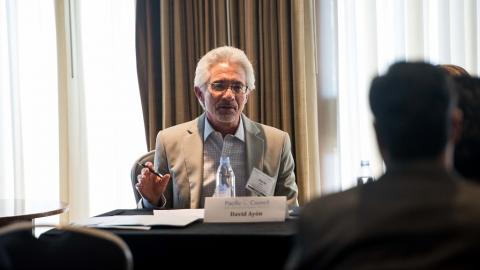
Ayón pointed out that there is a lot of uncertainty about Mexican politics in general, not just the outcome of next year’s election.
"Even before there was a ‘Trump factor,’ there were already other factors in place," he said. "Mexico underwent political reform in 2014. The members of the legislature elected next year will be able to run for reelection for the first time in modern Mexican history. And not everything is up for election next year, but almost everything is, including over 2,700 offices. Also, this may be a unique mobilization of an electorate in world history, where the machinery of the state will be utilized to mobilize people. There are things that could completely change the way we understand the dynamic of Mexican politics in just a few months."
He also pointed out that the Mexican people are ready for a change as well, as there is a sense that Mexico has experienced three failed presidencies in a row.
Finding common ground in U.S.-Russia relations
Moderated by Ms. Ann M. Simmons, global development writer and editor at the Los Angeles Times, this panel featured Dr. Sharyl Cross, director of St. Edward’s University’s Kozmetsky Center, and Dr. Yuval Weber, visiting assistant professor at the Daniel Morgan Graduate School of National Security. Cross and Weber both serve at the Wilson Center’s Kennan Institute as a global policy scholar and a global fellow, respectively.
In the past few years, Russia’s renewed assertiveness on the international stage has manifested in bellicose political rhetoric, military aggression, and even territorial conquest. Some of Russia’s actions, such as annexing Crimea and entering the war in Syria, have exacerbated tensions with Western countries.
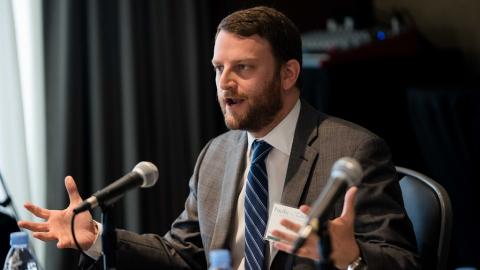
Weber pointed out that Russia, under Vladimir Putin’s leadership, is trying to regain the superpower status it had under the Soviet Union.
"Russia knows that whoever is the U.S. president after Trump will bring the hammer down on them," he said.
Cross argued that a robust management of U.S.-Russia relations is needed in order to avoid deepening distrust and conflict. She encouraged the two countries to focus on areas where they can collaborate and cooperate.
"The United States and Russia must seek to re-establish rules for interaction between the two states."
Sharyl Cross
"Restoring trust is hard," she said. "The United States and Russia must seek to re-establish rules for interaction between the two states."
Ahead of Members Weekend, Cross wrote a three-part series in the Pacific Council’s Newsroom about Russia’s challenge to the liberal world order. Click here to read parts One, Two, and Three.
Tackling the cybersecurity problem
Moderated by Mr. Karlo Barrios Marcelo, program and development manager of the Mayor’s Fund for Los Angeles, this panel featured Mr. Ernie Liu, director of global security consulting services at FireEye's Mandiant, and Dr. Caolionn O’Connell, physical scientist and associate director of the Arroyo Center’s Forces and Logistics Program at the RAND Corpoation.
In March 2017, the Pentagon warned that China and Russia pose the most significant threat to America’s cybersecurity. Critical American infrastructure, including the nation’s electric grid, will remain vulnerable to catastrophic cyber-attacks from Russia and China for at least the next decade. In response to this ongoing threat, the U.S. Defense Department’s Defense Science Board has concluded that these vulnerabilities must be mitigated by urgently developing new cyber deterrence capabilities, including offensive cyber weapons designed to inflict damage on our adversaries and their leaders.
"It will take global cooperation to tackle the cybersecurity problem."
Ernie Liu
"It will take global cooperation to tackle the cybersecurity problem," said Liu. "It’s an asymmetric playing field. You don’t need a lot to be able to cause great damage. A group like ISIL, that has no fear of repercussion, can basically operate with impunity if they develop their capabilities."
O’Connell said that many people do not realize how easy it is for hackers to access and exploit digital weaknesses.
"There’s a lot of uncertainty," she said. "I would like to think that attacking our energy infrastructure is not high on the list of a potential adversary, but even more interesting to me is when our weapons systems start to get attacked. If those are capable of being taken offline, I don’t know what that means for warfare and how that would fundamentally change how we would approach war. It’s an unnerving future."
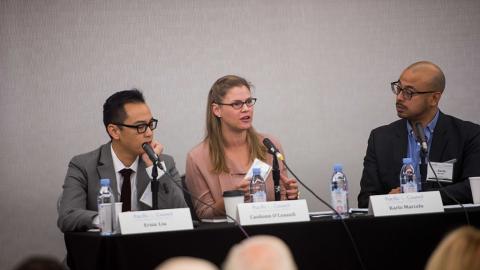
She pointed out that there are different levels of cyber threats, from kitty hackers to the dark web to niche firms to state-sponsored cyber warfare.
"What’s happening in the real word, we see in the cyber world," said Liu. "From a U.S. perspective, the major players are Russia, China, Iran, and North Korea."
Gutting of the State Department
Moderated by Mr. David Helfenbein, senior vice president of Main & Rose, this panel featured Ms. Elisa Massimino, president and CEO of Human Rights First, and Ms. Karen Richardson, former deputy assistant secretary in the U.S. State Department’s Bureau of Public Affairs.
The Trump administration has proposed steep budget cuts of just over 30 percent to the State Department’s annual budget. Morale is low at the department as career diplomats resign and the administration shrinks the payroll or declines to fill key positions, including ambassadorships.
"My main concern with the proposed cuts is that they would make fostering American leadership on human rights immeasurably more difficult," said Massimino. "The leadership by the United States is not only essential for advancing human rights around the world, but it’s also vital for global stability and therefore vital for our own security here at home. And we can’t lead without a strong State Department."
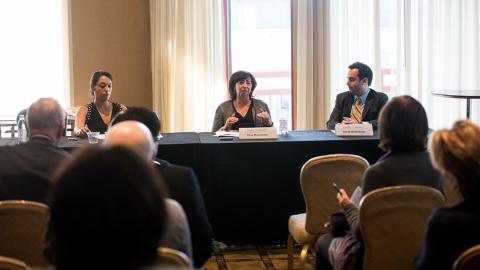
She added that if the United States leaves a vacuum in terms of international leadership—by ceasing humanitarian assistance, brokering peace agreements, maintaining alliances, and contributing to multilateral institutions—another power that does not align with U.S. values will fill it.
"We heard from General Robert Brown, coming straight from the military, saying military force has to be the last resort," she said. "So the first, second, third, and all the things in between, that’s stuff that the State Department does. The military agrees the United States needs a well-funded State Department. If your overriding goal was to undercut American leadership on human rights, for sheer efficiency you couldn’t do much better than gutting the State Department."
Richardson agreed that cutting the budget for global health, development, and international organizations hurts the United States’ national security strategy.
"Educating more Americans about the benefits of diplomacy is one of the best ways to respond to the Trump administration’s State Department cuts."
Karen Richardson
"Rebuilding the diplomatic infrastructure of the State Department will take a while," said Richardson. "Recruitment of new talent is at stake. Educating more Americans about the benefits of diplomacy is one of the best ways to respond to the Trump administration’s State Department cuts."
Ahead of Members Weekend, Massimino wrote an article for the Pacific Council’s Newsroom on diplomacy, development, and Trump’s "America First" budget. Click here to read the article.
Beyond the Paris Climate Accord
Moderated by Mr. Ivan Penn, writer at the Los Angeles Times, this panel featured Ms. Suedeen G. Kelly, partner at Jenner & Block, Mr. Edward Muller, member of Transocean Ltd.’s Health, Safety, and Environment Committee, and Dr. Peter R. Hartley, the George and Cynthia Mitchell chair in sustainable development at Rice University.
Despite President Trump’s announcement of his intention to withdraw the United States from the 2015 Paris Accord in June, the agreement continues to represent historic action on the part of the global community to fight climate change. However, developing clean energy technology will be vital to ensure that the signatory countries are able to meet the ambitious reduction targets they set out for themselves.
Kelly said she does not believe the sky is falling in just because the Trump administration is withdrawing the United States from the Paris Accord.
"Because the Paris Accord is non-binding, whether we’re part of it or not isn’t as important as what were we going to do to implement it, and are we still going to do that?"
Suedeen Kelly
"Because the Paris Accord is non-binding, whether we’re part of it or not isn’t as important as what were we going to do to implement it, and are we still going to do that?" said Kelly. "The Obama administration was looking to implement it in large part with the Clean Power Plan, a regulatory approach to the electric sector to mandate effectively the retirement of coal. The Trump administration is not supportive of that."
Kelly pointed out that U.S. electric and gas markets can solve the challenge of carbon emissions because coal and oil are uneconomic. On its own, Kelly said, coal is losing market share, it’s not able to recover its costs in the market, and it’s retiring rapidly.
Muller argued that the uncertainties of politics around energy impact the economics of the industry.
"In a very capital intensive industry such as energy, when the political process keeps changing the rules, the ability to invest wisely is effected," said Muller. "Renewables, which look like they are part of the future, they require subsidies because fossil fuels are cheaper. California is spending more on climate issues than it spends for the University of California system. The cost, on average, per household in California for addressing climate issues is about $3,000 a year. Is that bad? Not necessarily. It might be a good thing. But is it understood by the public? Not at all. For someone who has been involved in deploying capital, this is worrisome because political subsidies change."
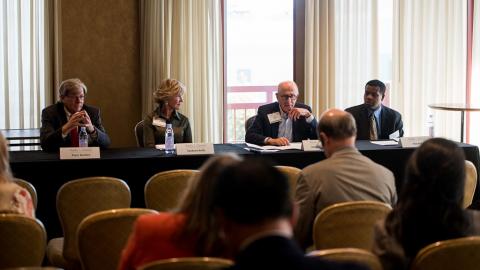
Hartley pointed out that high gas prices in the early 2000s in the United States stimulated much of the investment and development in new technology. Low-priced natural gas, which he said is by far the cleanest burning fossil fuel, has now replaced a lot of coal.
"Making natural gas more available internationally will have a tremendous impact on pollution," he said, adding that the United States is now poised to be one of the main exporters of natural gas.
Seeing through the narratives of nationalist populism
Moderated by former U.S. Ambassador to Hungary Colleen Bell, this panel featured Dr. Mabel Berezin, professor and director of undergraduate studies at Harvard University, and Mr. Ehsan Zaffar, senior advisor at the U.S. Department of Homeland Security (who was speaking in his personal capacity).
Once viewed as a fringe phenomenon during the advent of globalization, populism has rebounded across numerous developed Western nations over the past few years. From the Brexit vote in Britain and the election of Donald Trump in the United States to the rise of far-right and anti-immigrant political parties like Alternative für Deutschland in Germany and elsewhere, populist movements have rattled the political establishment in the West and the liberal world order that has existed since the end of World War II.
Berezin said people have to be careful when they talk about nationalist populism so they don’t fall into narrative traps.
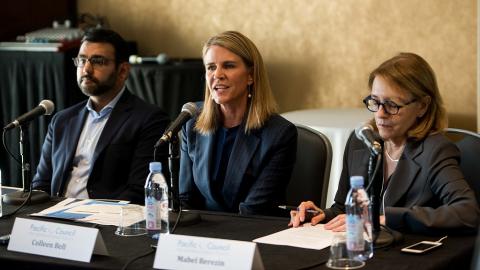
"We have to keep in mind that when we talk about right-wing populism, we’re basically talking about citizens making electoral choices," she said. "Nationalist populism has been very hard to ignore lately. The events of 2016 generate competing narratives among commentators, academics, and policymakers. These included a ‘newness’ narrative and an ‘end of populism’ narrative, but nationalist populism is not new and was certainly not defeated last spring during the French presidential election. These narratives are unhelpful going forward. They create a false sense of resolution when in fact populism’s roots are deeper and are important to understand, especially when trying to come up with solutions."
Zaffar said in conversations he’s had with many supporters of nationalist populism, there was a "deep, abiding sense of cultural dislocation and anxiety. This represents itself in the narrative that immigrants are bad or are taking away jobs. Their primary value is not multiculturalism, but rather economic survival."
The high-profile personalities who typically lead these populist movements are good at figuring out what scares people, Zaffar added, and using language that provides a quick and simple solution.
"What a charismatic, populist leader does, at the very least, is make his followers feel less afraid or alone or disconnected, and that’s why you see people behave irrationally and against their political and economic interests."
Ehsan Zaffar
"What a charismatic leader does, at the very least, is make his followers feel less afraid or alone or disconnected, and that’s why you see people behave irrationally and against their political and economic interests, because it’s more of an emotional motivation rather than a rational or logical motivation," he said.
Ahead of Members Weekend, Zaffar wrote an article for the Pacific Council’s Newsroom calling for a progressive populism. Click here to read the article.
How climate change compounds the refugee crisis
Moderated by Mr. Seth Stodder, former assistant secretary at the U.S. Department of Homeland Security, this panel featured Dr. Alex Julca, economic affairs officer in the UN Department of Economic and Social Affairs’ Development Policy Analysis Division, Dr. Karla Heidelberg, professor of biological sciences and environmental studies in the USC Dornsife College of Letters, Arts, and Sciences, and Dr. Robert J. Lempert, director of the Frederick S. Pardee Center for Longer Range Global Policy and the Future Human Condition at the RAND Corporation.
Migration due to climate change is quickly becoming a reality for coastal communities and island nations as sea levels continue to rise. Despite this reality, the international legal system has been slow to catch up—"climate refugees" (those who cross borders due to environmental factors) are not protected as those who cross borders due to persecution and war.
"Climate change is causing and will continue causing instability in the developing world," said Stodder. "We have international legal policies to account for war and economic migrants, but not for climate refugees."
"In the challenging scenarios, where economic growth is not what we want it to be, there are roughly 100 million people who are going to be in extreme poverty who would not have been without climate change."
Robert Lempert
Lempert said the numbers of potential climate refugees could be staggering.
"In the challenging scenarios, where economic growth is not what we want it to be and climate change is really severe over the next couple decades, there are roughly 100 million people who are going to be in extreme poverty who would not have been without climate change," he said. "But developing nations do have an advantage because they’re building things anew, so they can do it right."
That said, Julca pointed out that the refugee crisis—compounded by climate change—is a problem for both developed and developing countries. He said that when it comes to climate change’s impact on the refugee crisis, it is important to keep in mind the origins and destinations of refugees as well as whether they have high or low skills.
"About 85 percent of migration from Africa is not to Europe or the United States, it is within the African continent," said Julca. "As for the skills of refugees, high income countries need both high and low skilled migrants, not only high skilled."
"Climate does change how people migrate and move around the world. That contributes to political instability."
Karla Heidelberg
Heidelberg stressed the need for experts today to teach and train the next generation about both the science and policy aspects of this issue.
"Climate does change how people migrate and move around the world," said Heidelberg. "We think of those as direct things, like a hurricane or tornado that displaces people, but what we’re not as good at seeing are the slower changes. For example, the slow desertification of areas that in the past were not deserts and now they are, so there’s crop failures, food security issues, and that contributes to political instability."
The panel agreed that the leadership of nations today are not prepared for issues of climate change that will disrupt the world, and that they must start thinking long-term.
____________________
Justin Chapman is the Communications Associate at the Pacific Council on International Policy.
Read more about this year's conference at the Members Weekend 2017 website. Watch videos and read summaries of Representative Karen Bass' keynote address, the plenary on the future of automation, Jerry Green's remarks on the Iran deal, the debate about President Obama's foreign policy, and an interview with General Robert B. Brown. Check out photos from the conference on our Flickr page.
Members Weekend is the West Coast’s premier forum on global affairs, convening business, civic, government, and academic leaders to exchange ideas and collaborate on pressing global issues. Take a closer look at this year's event, and read all Members Weekend analysis now in our Newsroom.